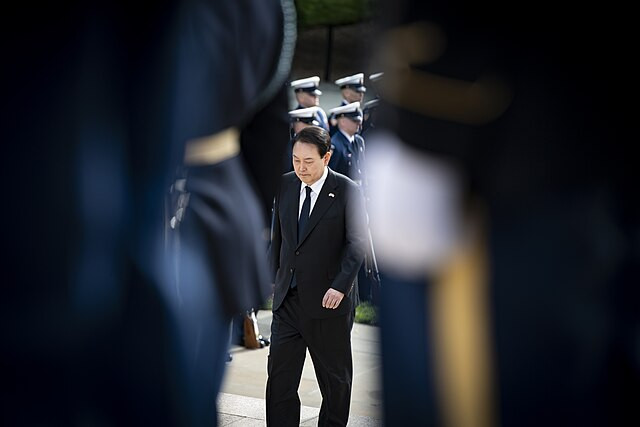South Korean President Yoon Suk Yeol, impeached last month, was detained late Wednesday following a dramatic standoff at the presidential compound. Yoon's detention marks a historic moment as he becomes the first sitting South Korean president to face arrest. He now confronts allegations of rebellion tied to his controversial martial law declaration on December 3.
The Corruption Investigation Office for High-Ranking Officials (CIO), in collaboration with police and military forces, apprehended Yoon after hours of negotiations at the presidential residence in Seoul. Hundreds of officers were deployed in a coordinated operation to execute the warrant, which Yoon's legal team had repeatedly challenged.
In a video message released before being taken into custody, Yoon criticized the investigation, calling it "illegal" and stating that his compliance was an effort to prevent violence. The "rule of law has completely collapsed in this country," Yoon said, while maintaining that his martial law declaration was a legitimate response to an "anti-state opposition."
Yoon declared martial law last month, citing what he described as a legislative dictatorship by the opposition that paralyzed state affairs. The decree, which briefly deployed troops around the National Assembly, lasted only hours before opposition lawmakers managed to vote for its repeal. His impeachment followed on December 14, shifting presidential authority to Deputy Prime Minister Choi Sang-mok and leaving Yoon in legal limbo.
The tension culminated on Wednesday morning when anti-corruption investigators and riot police surrounded the presidential compound. After a brief standoff with Yoon's security detail, law enforcement entered the residence and negotiated for hours before escorting Yoon out in a motorcade.
Hundreds of protesters, both supporters and critics of Yoon, gathered outside the compound during the operation. Demonstrators in favor of his detention cheered as the CIO confirmed his apprehension, while others lay in the street in protest, requiring removal by police.
Following hours of questioning, Yoon was transferred to a detention center near Seoul. Under South Korean law, the CIO has 48 hours to request a formal arrest warrant, which would extend Yoon's detention for up to 20 days while the case is prepared for prosecution. If convicted of rebellion, Yoon could face life imprisonment or even the death penalty.
The martial law declaration and its aftermath have polarized South Korean society. Younger generations, who grew up in the country's stable democracy, have overwhelmingly supported Yoon's impeachment. A recent Gallup poll found that 75% of respondents aged 18 to 29 backed his removal from office.
In contrast, older South Koreans have expressed concern over the political instability caused by Yoon's impeachment. "The president is the pillar that supports our country and the vanguard of liberal democracy," said Jeong Hyung-mok, a 76-year-old retired teacher protesting Yoon's detention.
The CIO has accused Yoon of leading an attempted rebellion, citing the deployment of troops around the National Assembly as a direct threat to constitutional order. Yoon's defense team has argued that the detention warrant is invalid, citing laws that protect military-linked locations from search without presidential consent.
Deputy Prime Minister Choi Sang-mok reassured foreign diplomats on Wednesday that the government remains stable despite Yoon's detention. The acting leader has emphasized the importance of maintaining order as the Constitutional Court considers whether to uphold Yoon's impeachment or reinstate him.
The unfolding crisis has drawn parallels to South Korea's tumultuous political history, when military coups and authoritarian rule were prevalent. Protesters like 20-year-old Choi Haysu compared Yoon's martial law declaration to the violent crackdowns of the 1980s, saying, "If the National Assembly had failed to stop martial law troops, I feared the kind of violent crackdowns I saw in history books would happen."




